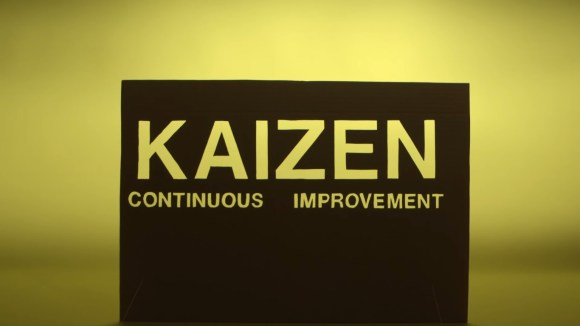
Over a year and a half after Hurricane Sandy ravaged New England, some people are still without permanent housing. The poorest populations in New York have been impacted the most, dependent on aid long after the rest of the city moved on. Several major companies got together to assist in the effort for aid, but Toyota had a novel contribution: efficiency.
Toyota sent experts to New York for eight weeks to help Food Bank of New York’s partner organization, Metro World Child, improve their methods, thereby helping to get food donations to as many people as possible using as few labor hours as possible. The improvements meant that the same resources were used to provide food to more families faster.
Consultants Jami and Lisa visited Metro World Child (among other non-profits across the US) to teach principals developed at Toyota to improve efficiency. Toyota Production System (TPS) is based on the idea that “the summation of many, many, small, simple, cheap improvements can have a very big impact.” It is related to the concept of “kaizen,” or “continuous improvement.”
After observing the charity’s usual method of operation, they had some advice that completely changed the experiences of the volunteers and the communities they serve. The consultants’ first step was to “eliminate waste.” The charity packs boxes of food designed to provide three days’ worth of balanced meals for the average-sized family. Lisa explains, “What about a different box size? So that we’re not shipping so much air.”
It sounds like a minor issue: air doesn’t add any weight, so why does it matter? Jami continues, “If we could go to a smaller box, we would have the benefit of being able to put more meals on the truck to serve more people.” With the larger boxes, they were able to ship 864 boxes per shipment, but after changing to the smaller boxes, they could fit 1,260 per shipment—nearly a 50% increase!
George, who is in charge of Metro Food Distribution, explains it perfectly: “When we’re down to our last box, and you have like seven families standing on the line, and you just have that one box, and you don’t know what exactly to do, that kills me.” Thanks to the new boxes, George isn’t as likely to have that dilemma.
Their next step was to “create continuous flow.” They noticed that the volunteers had a difficult time packing boxes. Each volunteer was responsible for packing one box at a time with approximately 25 pounds of food. They walked from pallet to pallet in a crowded room, sometimes struggling to open wrapping or balance heavy boxes. It took an average of about three minutes to pack a single box.
▼ That’s a lot of walking around!
▼ And a lot of things that are awkward to carry!
By rearranging the room, they cut down on the distance the volunteers traveled, the energy they spent packing—and most importantly, the time it took to pack each box. Jami explains that “by putting everybody on one side of the line and having the material come from the opposite, we think we’re going to get a smoother flow.” After the adjustments to the process, they were packing each box in about 11 seconds.
▼ It even looks a lot more manageable for the volunteers.
▼ By utilizing a roller line, they hardly have to lift boxes at all.
They also brought some of these improvements to the distribution points. It allowed them to get the donations off the truck and to the people much more easily and quickly. Where it once took about three hours to hand out food at one site, it now took only 1.2 hours. That means shorter waits for the recipients, who could get back to their lives that much sooner.
▼ With this many people to serve, no one wants to drag their feet.
▼ Many people likely walked to the distribution site.
▼ The roller line makes it possible to line the boxes up—no waiting to pass them down!
▼ That makes George a happy man!
As a result, they are serving about 400 more families than they were, but in only half the time.
▼ In other words, they have become ninjas of giving.
For the whole uplifting story, watch “Meals Per Hour” on YouTube.
While donations are crucial for charities like Metro World Child, improvements to efficiency mean those donations can go much, much further. When you think about all the non-profits serving people all over the world, such a simple change in approach has the power to do a huge amount of good. Here’s to companies like Toyota for sharing their intellectual as well as material resources!